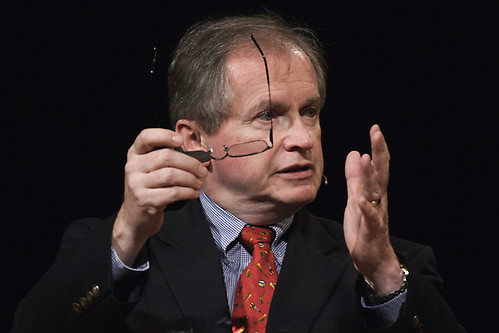
Countless volumes have been written on this subject, of course. Here I shall restrict myself to five observations.
First, preaching is more than the oral communication of information, no matter how biblical and divine that information may be. Rather, we should think in terms of what might be called "re-revelation." Across the centuries, God disclosed himself--he revealed himself--in great events (e.g., the burning bush, the exodus, the resurrection of Jesus); he disclosed himself supremely in the person of his Son. But very commonly he revealed himself by his words. Perennially we read, "The word of the Lord came to such-and-such a prophet." So when that Word is re-announced, there is a sense in which God, who revealed himself by that Word in the past, is re-revealing himself by that same Word once again. Preachers must bear this in mind. Their aim is more than to explain the Bible, however important that aim is. They want the proclamation of God's Word to be a revelatory event, a moment when God discloses himself afresh, a time when the people of God know that they have met with the living God. They know full well that for the Scriptures to have this revelatory impact the Spirit of God must apply that Word deeply to the human heart, so that preaching must never be seen as a mere subset of public oratory. Both the content (the Bible is God's Word) and the transformative empowering (the Spirit himself) transcend any merely mechanical view of preaching.
Second, to remain true to this basic understanding of what preaching is, the preacher must be committed to the primacy of expository preaching. We must take pains to debunk what many people think "exposition" and "expository" mean. They associate exposition with a style that takes not more than half a verse per sermon and casts around widely for every conceivable association, biblical and pastoral. Certainly that is one form of exposition, but that form is not the essence of the matter. Exposition is simply the unpacking of what is there. In a narrative text (e.g., 2 Samuel) or major epic (e.g., Job), fine exposition may focus on several chapters at once. If a sermon takes two or three short passages from disparate parts of the Bible and explains each of them carefully and faithfully within its own context, it remains an expository sermon, for it is unpacking what the biblical text or texts actually say. If we expect God to re-reveal himself by his own words, then our expositions must reflect as faithfully as possible what God actually said then the words were given to us in Scripture.
Third, there is an heraldic element in preaching. The Bible sometimes envisages other forms of oral communication, of course: we may be invited to reason together with the Lord (Is. 1:18), for instance, or enter into a dialogical confrontation with him (e.g., Mal. 1:2-8; Rom. 6:1-2). Yet in the oft-repeated "Thus says the Lord" of the Old Testament is an unavoidable heraldic element--an announcement, a sovereign disclosure, a nonnegotiable declaration. As ambassadors, we are tasked with making known the stance and intentions of our Sovereign; we do not have the authority to tamper with his position.
Fourth, preaching is never an end in itself. It is not an art form to be admired, still less mere high-flown rhetoric that so captures the audience's imagination that the content is of little importance. This is not to deny that artistry and rhetoric may be traced in sermons; rather, it is to keep ultimate ends in constant view. The faithful preacher will care little what folk think of his oratorical skills; he will care a great deal about whether he has faithfully represented the Master and his message. This includes a passionate commitment to make the Word wound and heal, sing and sting.
And that means, fifth, that we must study our own people, the culture of the people to whom we minister. Inevitably there are commonalities from culture to culture, but there are countless distinctives as well. To communicate effectively we must address the people of the time and place where God has placed us. This is a perennially urgent need in the thoughtful and faithful preacher....



4 comments:
Thanks for the post.
You may have noticed this, but it is posting with a 2009 date and can cause havoc for us multiple RSS subscribers.
A great essay on true preaching. It ought to be required study by all who seek to proclaim God's Sovereign Grace. Thanks, brother for posting it.
It's been said that Catholics overemphasize the Eucharist at the expense of the homily. I agree with qualification.
Maybe Evangelicals overemphasize the sermon at the expense of the Eucharist and even the liturgy as a whole.
Hey there, I ran across your site and thought I would say hello. Liked your blog! Check out my latest blog - we are looking for as many people as possible to go on an 'Internet Offensive'with us. Check it out at: http://time2stand.wordpress.com/2008/12/30/professing-christians-churches-church-members-this-is-your-wake-up-call-the-time2stand-is-now-a-urgency-to-rise-is-at-hand-we-will-be-held-accountable/
God bless,
Keep your focus on Christ
Your brother in Christ Jesus
Jeremy Strang
Post a Comment